Search results
13 results found.
13 results found.
| Enrollment | Staff | Budget | |
|---|---|---|---|
| Boston | 56,650 | 9,125 | $1,153,000,000 ($20,353/student) |
| Long Beach | 78,230 | 6,515 | $1,133,478,905 ($14,489/student) |
| Madison | 25,231 | 4,081 | ? $421M + “Construction” and ? (at least $17k/student) |
In 2013, Madison Superintendent Jennifer Cheatham said “What will be different, this time“? The Superintendent further cited Long Beach and Boston as beacons in her Rotary speech. However, based on recently released 2015-2016 budget slides (PDF) and Molly Beck’s summary, it appears that the same service, status quo governance model continues, unabated.
“The thing about Madison that’s kind of exciting is there’s plenty of work to do and plenty of resources with which to do it,” Mitchell said. “It’s kind of a sweet spot for Jen. Whether she stays will depend on how committed the district is to continuing the work she does.”
The District seeks increased tax & spending authority soon, perhaps in November. Ideally, a complete budget picture – with related outcome changes over time – would be easy to find and understand. Unfortunately, that is not currently the case. Boston publishes a handy 2 page summary (pdf).
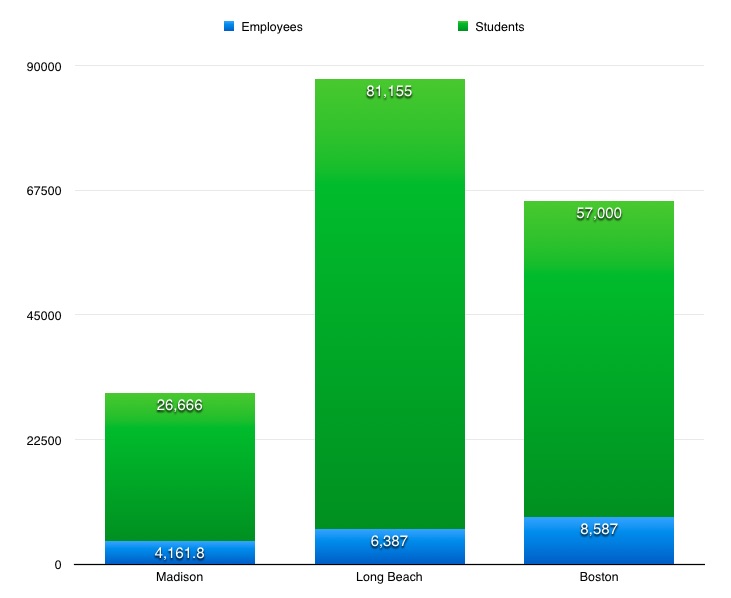
In 2013, Madison Superintendent Jennifer Cheatham said “What will be different, this time“? The Superintendent further cited Long Beach and Boston as beacons in her Rotary speech.
However, based on recently released 2015-2016 budget slides (PDF) and Molly Beck’s summary, it appears that the same service, status quo governance model continues, unabated.
“Beware of legacy practices (most of what we do every day is the maintenance of the status quo), @12:40 minutes into the talk – the very public institutions intended for student learning has become focused instead on adult employment. I say that as an employee. Adult practices and attitudes have become embedded in organizational culture governed by strict regulations and union contracts that dictate most of what occurs inside schools today. Any impetus to change direction or structure is met with swift and stiff resistance. It’s as if we are stuck in a time warp keeping a 19th century school model on life support in an attempt to meet 21st century demands.” Zimman went on to discuss the Wisconsin DPI’s vigorous enforcement of teacher licensing practices and provided some unfortunate math & science teacher examples (including the “impossibility” of meeting the demand for such teachers (about 14 minutes)). He further cited exploding teacher salary, benefit and retiree costs eating instructional dollars (“Similar to GM”; “worry” about the children given this situatio
Boston Teachers Union Contract (PDF) Wordcloud: 
Long Beach Teachers Union Contract (PDF) Wordcloud: 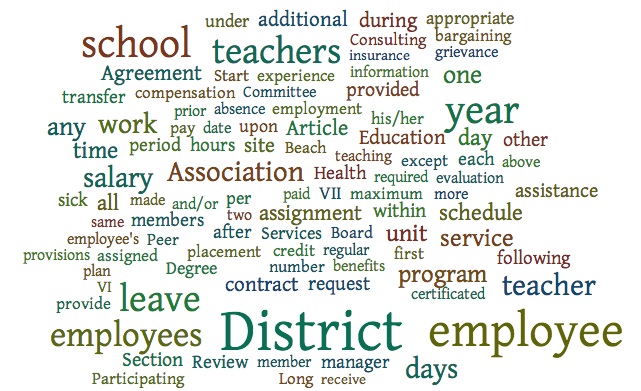
Madison Teachers Union Contract (PDF) Wordcloud: 


Boston Teachers Union
Teachers Association of Long Beach
Madison Teachers, Inc.
Related: Comparing Madison, Boston & Long Beach Public Schools, Part 1: Student/Teacher Ratio
Madison Superintendent Jennifer Cheatham recently cited the Boston and Long Beach Schools for “narrowing their achievement gap” during a July, 2013 “What Will be Different This Time” presentation to the Madison Rotary Club.
As time permits, I intend to post comparisons between the Districts, starting today.
Student / Teacher Ratio
Per Student Annual Spending
Boston Schools’ budget information was, by far the easiest to find. Total spending is mentioned prominently, rather than buried in a mountain of numbers.
Finally, after I noticed that Madison’s student / teacher ratio is significantly lower than Boston, Long Beach and the Badger state average, I took a look at the Wisconsin DPI website to see how staffing has changed over the past few years. Madison’s licensed staff grew from 2,273 in 2007-2008 to 2,492 in 2011-2012.
What are the student achievement benefits of Madison’s very low ratio?
Related: Madison Schools’ 2013-2014 budget includes a 4.5% property tax increase after 9% two years ago.
“Plenty of resources” and “the Madison School District has the resources to close the achievement gap“.
Infographic, via a kind reader email:
After two years of operation, we are setting a new level of academic and behavioral expectations for our nearly 500 students. Today, our school environment promotes an atmosphere of rigor and joy and leads students to internalize important, positive lifelong values. We are proud of the progress that we have made, as we have many achievements to celebrate.
While we are excited about the work of our students and teachers in year two, we are poised to move from a turnaround school to a truly excellent school. Our mission is still alive: We will work with urgency until all of our students acquire the knowledge, skills and strength of character necessary to succeed on the path to college and to achieve their full potential. The 2013-2014 school year will be an extraordinary and critical one for our school community, as UP Academy aspires to do whatever it takes to create responsible and independent scholars.
Related: Comparing Boston, Long Beach and Madison schools, and the rejected Madison Preparatory Academy IB Charter school.
mp3 audio – Machine Transcript follows [Better transcript, via a kind reader PDF]:
I’m Carousel Baird and we have a fabulous and exciting show lined up today. Such a fabulous guy sitting right across from me right here in the studio. Is Madison metropolitan school district current superintendent? She still here in charge of all the fabulous thing it is. Dr. Jennifer Cheatham.
Hello, Jen. Hey Carousel. Hey everybody. It’s good to be here. Wonderful to have you and I do want to just take it off. You know, you’re leaving at the end of the summer moving on to other Adventures but to say first of all, thank you to your accessibility. We’ve had a lot of conversations. We have you and many of your leaders. They aren’t always easy going conversation there. I believe yeah. But they’re important conversations and your availability to answer questions and be on the show and come and have these conversations is really important to Madison. So thank you. Well, thank you for asking.
It’s been wonderful every time and I’m sure it’ll be wonderful again another great show. That’s right. We’re gonna make it happen. I don’t know I’ll burn down all the bridges really until nothing to lose. All right. Well, let’s sort of start with a I have very few statistics that I brought. Just a few. Okay. It’s a few there’s approximately 27,000 students career and MSD more than 50% or students of color including 18 percent that have self-identified as African-American 21 percent that have identified as lad necks. 32 elementary schools 12 middle schools six high schools. There you go. Those are the stat.
It’s big for Dane County, but it’s not it’s not huge and compared to other big cities. Does that make it more manageable? I can work with those six years ago when you showed up and not that I want to be the superintendent of Madison. Yeah, it felt like a world that you could play a role in no doubt. No doubt. I think you know this Carousel, but I worked in San Diego before coming to Madison where there are 200 schools. Then Chicago we’re at that time there were about 600 schools. And so coming to Madison. It did seem doable to the challenges seemed hard even from the outside, but they seem doable but I always imagined. Wow, I could have all 50 principles in a room together. Right right, and we can just talk real talk and that’s been true. I mean, it’s been wonderful. That way yeah big challenges but doable because of the size and the community that we had 11, so.
First of all, congratulations on your new position you’re moving off to Harvard University that I mean, I think that bodes well for us for that leader is from Madison move on to Harvard University big. So thanks for representing Madison and at Harvard. That’s that’s excellent. No doubt.
I think sometimes when we’re. In our own communities, we lose perspective on them and as much as we have challenges, we have tremendous strength and school districts outside. Of Madison nationally have looked to us right have come to us for guidance and advice for Lessons Learned some of them learn the hard way, right but important lessons that we’ve gleaned.
So I want people to know that not only have we made progress here within our community, but we’ve been already Madison’s been influencing the field of Education Beyond Madison. Is that right when we’re in it? Are we see are the challenges right? Because like okay, here’s another problem. Let’s work on that. Here’s another and you know, that’s the daily job of solving problems, but understand that it is it because we’re at least a community that is willing. To address the challenges instead of trying to ignore them. I think so. I think that’s a part of it. I had a in still have a long time Mentor named Karl Cohen. He was the superintendent in Long Beach many years ago, and I remember my early days working with Carl he called. This work. He describes it as a hard slog right the hard slog of school Improvement, right? It’s not you don’t get to spike the football much right? There’s always another challenge to address right and it’s ultimately about children, right? So it’s like schools and school districts are at the center have Humanity right in all the challenges that come with. With being alive right exist in a school in a classroom in a school district.
So yeah, it’s challenging work. But I to your point, I think that Madison has as a community right of Educators, but of people have been able I think to talk about hard issues together. I’d love to talk to you about that more actually. Okay, I think it’s a it’s a it’s a major asset that we don’t talk about enough our ability to be in dialogue with one another even if we disagree even if we don’t go the route that you know change makers want to go the fact that we’re willing to have those conversations that I do every show on the table. I do I think that that’s a really valid. Let’s talk about.
So you’ve been here for six plus years was talking about the changes that you’ve seen in that six plus years. I think there have been a lot of changes. Okay, and I I mean, of course everyone’s going to think that. But they’re for the better, but I would say it was for the better. I think most of they have been for the better when I started six plus years ago the general sentiment. It was a difficult time in Madison. By the way, the contacts Act 10 had just happened. So the education Community was feeling incredibly demoralizing of astride devastated. I mean, you don’t get over if those feelings actually, I think they’re hard to get over. Yes. What else was happening at that time the right as I was starting the race to equity report was released. So everyone was kind of grappling what the reality is of the disparities between black and white people in our community putting numbers to the communities of color new these challenges all along and no longer could the white communities of Madison deny them when the numbers were boldly in their face, right?
So think about that though. So here we have teachers staff. Educators feeling demoralized because of actin and simultaneously being faced with the reality of these disparities, right? That’s really challenging. What else was happening at that time? Oh and the Urban League proposal for the charter school, right had just been denied why that was a tough. That was a tough moment in Madison, right? It was a tough moment was a very. Conversation tell me about it. It was intense. And so that was the context that I came into welcome. Yeah, right and I’m a parent Lee a very optimistic person. So I thought yeah we can do this. This is hard but. There’s an inflection point here, right? We can come together and find a better way of doing this and I felt like the all the ingredients existed in Madison to do so, so it’s interesting.
I given all that context what came up in those first.
Few months when I was on the job was a desire for just Direction and coherence right? There. Was this feeling that the district at that point in time, which is a point of I think some chaos, right? There’s another chaotic period of. Not knowing what direction to go in knowing that we were facing challenges but not knowing how to move forward everyone just needed and wanted desperately some direction, right and some coherence around the strategies that were being put into play. So I took that and ran with it and I think over these last five or six years we’ve accomplished that meaning we have real Direction. I still get regularly criticized for doing too much. Lunch, right that’s different from not having Direction. It’s hard to do when there’s so many things to do to have I’m sure I desire to fix not everything at once and yet you have to move all the balls forward a little bit at a time. I think that’s true. So my challenge has always been well. Okay, we are going to have to do a lot because there’s urgency right and there are children who need us to make progress now. So I can’t narrow the focus too much. But at least I can make sure that what we’re doing is coherent right that it all holds together and is leading us in a Direction that’s addressing the real problems that we face not the fake problems.
But the real ones and again, I think we’ve accomplished that I really wanted for us to adopt some more discipline ways of working. I wanted us out of the gate to invest in school leadership. Team School Improvement planning data use I just wanted us to be a more discipline organization sense of structure. God have structured of systems and structures and shared leadership structures. That would help the people who work most closely with children. To be empowered to make the best possible decisions. I remember I remember that. Yeah, I remember when you moved here. Yeah. I have a 7th grader so high had just gotten to know. Ms. And Madison Public Schools, right? I was an observer on some level before before you became our superintendent and I and I remember having a conversation with Marj Passman is a mentor and good friend of mine who was a mentor member of the Madison School Board.
Yeah, but I’m talking about how my daughter’s first grade class wasn’t learning the same thing. Add another first grade class across town in still in Madison because that wasn’t the structure that we had and that on some level. There was a lot of teacher freedom, but on another level kids you you couldn’t switch schools and expect to be able to have the same curriculum and you would either be Advanced or behind depending on where you go. Just because you move departments across the city.
Well, that’s an excellent point. It’s not like that anymore. No, and so in addition to creating more discipline in the ways we make decisions and how we measure success and learn from. Our failures and make improvement over time. We insisted on more instructional coherence. So let’s get clear on what we think great teaching looks like in the classroom. Let’s get clear on.
The standards right that we have to teach especially in literacy and Mathematics that has been the major Focus for these past five six years and and we insisted on on teachers not working in isolation, but working in teams, right? So there was a big investment and not just. As a learning community understand how we teach. But knowing a little bit more about what we all need to teach and how we how we need to work together as teams to continually reflect on the effectiveness of our practice. So teachers coming together on a regular basis to talk about what we taught last week. What do we learn from it? Which kids are getting it who isn’t what does that mean for what we’re going to do next week, right? And that sounds simple but it is just essential. I mean that is the core of what. All districts do and I could see if I feel like every time you start a new initiative or change things up. Not you specifically but everyone in general. Yeah, you almost have to go all in okay. This is what we’re doing. And then once you master it, you can pull back out so I could see a lot of challenges and difficulties of teachers that were fabulous teachers. Oh, yeah that. More of course. They taught our kids, of course, they were fabulous qualified teachers, but they weren’t as interested in making sure that their first grader was doing the same as another first grader was doing they had love and nurturing and. They wanted to inspire this these students to love education and not that they have to be I can’t think of the right word come combative with each other but there were definitely teachers that thrived because of the free form that we allowed and here you are now adding adding a structure to it.
Where do you think we are in the process? Do you think there’s a point where we can say? Okay, you’ve mastered the structured and now we can pull back out.
Yeah. Oh my God, that’s such a good question. I think that both the discipline ways of working that I described first. And this work that we’ve done around instructional coherence was. For a while and for some felt really constraining write your point and it would for great principals who felt like they had a leadership structure that was working or you know, like they were principals who were feeling those constraints to and certainly teachers and I’ve talked with enough teachers to know for a fact that that is absolutely true, but I think. Foot I buy what I’ve always believed was that it was a step in the process, right? Which is I think is your point but that’s not the end goal. The end goal is something more important the end goal for those discipline ways of working at the school and District level, especially at the school level related to sit planning. We’re so that at this stage we could even further Empower schools right to make their own decisions because now sit planning, I don’t know.
I’m so. Sorry something and I will Improvement planning which is kind of disciplined way of working. We’ve adopted at the school level for decision making okay and school-level focus areas. We want now that those disciplined ways of working are pretty embedded. Like they’re part of our culture and our way of working. We can actually further Empower schools to do what they think is right for their school Community right and in collaboration with. Our students their staff their their families. We the new strategic framework kind of lays out a strategy for further empowerment of schools. Same thing for the classroom experience. Now that we have more coherence right instructionally as a system. I do think that now we’re at the stage where what we can and should be thinking about is how to ensure that those the teachers have the freedom they need. To ensure that those are not just nurturing environments that build community which is essential but that there’s deep and Rich learning happening in the classroom. Right? It’s not standards alignment isn’t enough. It’s got to be instruction that’s meaningful to the children who are in the classroom, right? It’s got to be content where students can see. Themselves represented in the curriculum I so that they can understand the world around them and interrogate it. Like I just think that we’re at poised to bring instruction to another level and Madison without losing the coherence that we’ve created right we can Empower schools to make decisions for their communities without losing those discipline ways of working that we think are essential this essay about Madison when you inherited it that it really. Didn’t have this structure.
It really was a city that you know again, I’ve only been here for I’ve been here for how long have I been here at around 20 years now. I don’t know some so I certainly don’t know the history of this of the city, but I know the gentleman before you were white men that perhaps didn’t mind that. School a was completely different than school be they didn’t think about the academics because that wasn’t they weren’t I don’t I don’t want to slam these gentlemen at all, but for some reason that wasn’t Madison’s priority, I was sort of surprising. There’s a whole lot to unpack there as their Carousel. But so I don’t know. I know all I know is what I’ve experienced and. Not just me, but the people who have led in Madison the teacher leaders who are on their school based leadership teams, the principles the senior team of Madison. We are hardcore Educators right who have put the educational experience at the center right that the theory that we have adopted for change has been. Guest on improving the experience that students have. With their teachers around content that’s worth learning, right that is that is the hard slog of school Improvement, right?
Yeah, we’re talking with dr. Jennifer Cheatham superintendent of Madison Public Schools. We’d love your questions or comments, please join the conversation the phone call. The phone number is area code 6082562001. You can also send us a tweet at wort talk or a message on our Facebook page. Our page is a public Affair 89.9 FM Madison.
So Jen. Let’s talk about race. Okay, and it seems the intersect with everything that we do big picture is I sir our president is racist. I think our I think our country is racist. It is Madison racist. Yeah. Yeah, I think every individual. I think I’m reason I live in Wisconsin. I live in Wisconsin. I live in the United States.
I’m racist I am to I’m married to a black man and I’m a bi-racial son and I’m racist it is I’ve gotten myself into so much trouble for saying those words Carousel. Really? Yeah, I think you know, it’s funny. I’ve I love saying those words, but that’s a conversation. We were talking about at the beginning. Can we at least. Are there less admit it right? I think I out of all of the challenges that I’ve experienced in Madison being able to lead. For racial Equity to try to be an increasingly anti-racist leader, which means doing my own work, right? It means doing my own inside-out work simultaneously alongside everyone else who’s an educator Madison has that has been the most challenging aspect of this work and the most fulfilling in some ways right the most important the most powerful and the most. Anjing. Yeah. That’s sort of break break it down in so many pieces. Does this fit in with the conversation about the behavior education plan. It does because of The Bravery you say suspend and expel students of color at a tremendously High rate. I didn’t I didn’t pull up the numbers from six years ago. I’m happy I didn’t because I don’t we don’t need the numbers in front of us for you and I. To admit the things that we’ve already admitted and then Along Came the behavior education plan. That was really a challenging new way to look at things. Yeah. Yeah, I think let me let me I want to zoom out before we Zoom back into this because I do think it’s a great example of this work in action. I think in my first five years. We certainly were leading for racial equity and the main approach we were taking was to let me think a couple things. We were we were certainly talking a lot about. What it means for all of us to be culturally responsive Educators, right? How do we build relationships with students of color especially in a district where most of us most educators are white and white females like me and at the central office of the district level. We were very interested in both investing resources and tackling the. Institutional barriers that stood in the way of success for students of color and their families, right? So we’ve been all along, you know working on addressing those systems and structures, you know, we rewrote our strategic framework.
A couple years ago now launched it a year ago and the fall and tried. We thought we were ready and I think we were to take it a whole to a whole nother level and be even more explicit in that commitment. Right? We use the word anti-racism right that we are as Educators obligated to be actively anti-racist. You intentionally had a piece that talked about black Excellence. Yeah. We are focusing on our black. It’s to rise them up. And even though I think there has been criticism from the community of black Excellence. Let’s see it. But that’s the whole point. You’re at least you’re putting it out there. If you never put it out there. I can’t hold herself becoming an old accountable. That’s hey and he can’t measure. Your failure is it’s so the community that wants to tell us were failing. At least we’re saying you’re eight.
We said black excellence and we’re not meeting it at all.
No doubt and both of these simple things are different but half have to happen simultaneously, right? You have to lead for black Excellence, which is I mean, what what what is implied? I hope in those words is that. That black students are already excellent, right and that it is our job to yeah to cultivate that excellence and that we have an obligation simultaneously while we’re cultivating black Excellence to recognize and dismantle. Racism in all of its forms and we’re Educators who were held to a higher standard. This is a really big deal. I think for me the that work that we launched last year. What I wish I would have done better was to kind of preview for everybody what it might feel like. Right that we would feel excited and motivated by the commitment. And then when we started actually doing more of the work and holding ourselves accountable for it every time not just sometimes. That it would create a feeling of like not knowing of disequilibrium. I’m not sure being sure about your next step what I think it’s produced a lot in Madison right now is this feeling of. Of who’s the guy on the good side and who’s on the bad side? Right like yeah, which is really lines are very drawn the very drawn it’s fine because it is a step in the process. We just can’t stay there. Right? Like what we need to do as a community is a okay. Hi, this is this is natural feeling right when you’re faced with our own right racism the racism of the institution that we work for right? Like I have this ambivalent relationship with any school district.
I love it because I’m rooting for it and I hate it because it was. Kind of born out of out of racist ideal too many it right and that’s the rest the whole concept of institutional process what it is, you’re fulfilling your actual intentional institutional design, right which leads to racism. So it is natural to go through this feeling of disequilibrium to worry that you’re not on the good side, right and. And if we stay there things we may actually we will suffer as a result. We have to pull together and how that dialogue that we were talking about earlier in the show. Like we have to not let people leave the table but bring them back in and loving and compassionate ways. I actually think that Madison and the school district. Which is a kind of at the center of Madison will be stronger as a result of this dialogue, right? We’re going to get through it and we are going to be better the hope of the future. Yeah. I have no question about it because there is a movement underway in Madison not just in the school district. I mean our educators are phenomenal people who get it in our working heart to do this Inside Out work. And make our institution a better Institution for every child. I have no doubt but we have to stop pitting ourselves against one another right we have to stop looking for someone to blame and just accept that this is our reality right? It’s not just ours is that affects it? Yeah, and and where the people who are in these seats now right where the. Were the people do or learn leaders leaders do it?
Yeah, we have a question that came in Jen had a question on Facebook. Thank you Jenn for contributing to the conversation and using Facebook. Excellent. It does get related over to me. Ye success technology. She wanted to ask you dr. Cheatham to talk about what carrot parents can do. I almost had carrots. I guess I don’t know why maybe I’m hungry. Okay start over Jen wants to know what parents can do to. Push the school’s forward and to work on race and Equity issues. Oh, excellent. And I also I’m going to put my own little spin on me before of I think they’re different conversations versus white parents parents of color. I know that there’s so much intentional effort and we can talk about the successes there of getting families and communities involved. But we also live in a time where when people say where are the parents which I hear all the time. My answer is I don’t know working three jobs trying to knock it evicted. Taking the bus that doesn’t actually get them to where they’re going. They are just hoping that their kid is safe at school. They don’t have time to meet with the teacher because they don’t have enough time and money. To fight being evicted which is what they’re working on and then those are not I don’t think that’s anecdotal as a tenant rights attorney. I think those are very real lives of many many people. Absolutely. Sorry Jen. I co-opted your question there, but can you help us understand the complexity of wanting parents involved needing parents involved and also acknowledging that parents have. Overwhelming things of basic needs on their plate. Yeah, I parent partnership has been a steady Focus for us as well. I mean it was one of the major priorities in our initial strategic framework.
Shout out to Nichelle Nichols who’s been rocking it in that role. Yeah, one of the greatest thing Madison she is amazing and in our whole Focus there has been on. Parents as partners right as full Partners in the educational process. We have always felt that parents don’t need to be present in the traditional ways, which is what you are kind of getting at a minute ago Carousel to be our partners, but they need great communication. They need to know what’s happening with their child at school so that they can play a part in the ways that they that are possible for them. Meaning sometimes the most important thing a parent can do is just to check in with their kid right to talk about it to encourage them, right? You don’t have to come to the PTO or PTA meeting it on their math tests to say. Hey, how’s school going? Did you do feel safe and I’ll be there? How you challenged? I love you. I know you’re smart. Right? It’s right. Yeah, no question. Every parent of course does every that’s what every loving parent loving parent does absolutely they have a free five minutes at the end of the day, sometimes they don’t all kinds of ways to be partners with teachers and all the I’ve talked to a lot of parents over the years and I’ll tell you that relationship between the parent and the teacher is the one that’s most important to most parents, right? That’s a relationship. They want to have be really strong. I think to the Facebook question. Yes, what I’m reading into that is how beyond the typical parent partnership can parents be involved especially around this work on race and equity and I am and I would encourage. Especially the white parents and Madison to think very carefully about and deeply about this question. How do. White parents, especially parents of privilege unintentionally kind of hold up the systems and structures that need to be disassembled of every child is going to be successful the the wrong idea as a white parent and I live I’m a white parent in a predominantly white neighborhood in a predominantly white school that. We don’t have to talk about racism right don’t talk about it. We’re not racist. So we don’t talk about race, which is actually the wrong response when we live in a racist world, right? Yeah, I mean students need to talk about it, right they need to make sense out of this world around them, especially if they’re going to make it a better place. I think that’s essential but I think I’ve seen some leaders especially PTO and PTA leaders really lead this conversation while over.
Last couple of years I’ve seen PTO and PTA leaders introducing book clubs to read. I like books like Robyn D’Angelo is white fragility right among parents to better understand why they’re having some of the responses that they’re having to our efforts to address racial Equity had on. I mean, I would encourage. Parents be thinking about that. What inside out work do they need to do right? It’s not about what we do in the big ways necessarily the big initiatives. It’s what we do in the small ways our one-on-one conversations with our fellow parents, right how we challenge one another. I think that’s really important. And do you see those changes?
There’s so much to talk about we only had I known manage which is crazy. But do you see these changes? I do happening in Madison by the conversations of of and I think that’s the natural Progressive is to start with anger what we’re not racist. What are you talking about? My kid got a great education. I love Madison schools. Are you attacking Madison School? Yeah, we need to protect our schools, too. Sort of okay. Well, actually here’s a conversation. I just gave a here’s my tangent on this. I just gave a presentation on Criminal Justice Reform to Jewish Social Services and part of a tiny piece of my talk was about police in schools, uh-huh a tiny piece and it was just acknowledging. The school-to-prison pipeline and hey, here’s the percentage of African-American students that get tickets when their police are in our schools and all of a sudden people go. Oh, that’s why you’re mad about police and schools and that people in that room actually said that to me they were ready to say we don’t need police in schools, you know, but at least there was a moment of understanding that hadn’t trickled down to them of why would people only criminals are afraid of the police kind of thing. And I think that’s what you’re getting at. Is that do you see those conversations happening? I do I mean I again, I think there is a powerful.
An exciting movement underway in Madison that more and more people not just our Educators, but madisonians are are getting into this dialogue with one another right in the small moments and in the big ones and I think that bodes well for the future of Madison, we justwe you can’t step out of it. We can’t pity each other or people against one another even the police in schools issue. I mean, it’s such a good example care. Well, I think that bye. Criticizing and raising serious questions about the issue shouldn’t be misread as as being anti-police, but it always ends up sounding that way right and there might be people on that position that are anti-police but that’s not the core of what they’re saying and you and you use the excuse of anti-police to stop listening you what they’re saying. You got it. It’s a really. Easy way to shut down the conversation and what I want us all is to stay in it together, right? Let’s not shut down the conversation. Let’s figure out what is the real problem that we are trying to solve and if we can do that we’re going to be okay and you feel like we’re moving so back to Madison schools were what talk to us about some of the programs and the initiatives that you feel are moving us.
Especially there was a collar and then he got disconnected sorry about that Dan. He had a question about the achievement Gap and I don’t know the details of what his question was but moving forward with how do we raise, you know? Address the racial Equity that exists. Yeah. Well, I think that’s what this new strategic framework is all about. I’m very hopeful board I think is very supportive of continuing to move in this direction and I would hope would find a future leader who’s capable of leading this work. But but yeah, I think we’re poised for really really powerful things what needs to happen to end racial disparities in Madison schools. Oh gosh, I mean this not any one thing right? I mean I think the center of it if I had to pick one thing Carousel it would be to for everything that we do to be ultimately aimed at. Seeing each other’s Humanity it does that sound too fluffy. That’s what we need to do. Right everything. We do the way we. Organized schools right through the school Improvement planning process and our decisions about instructional design if we made all those decisions to make sure that you experience a school day and I deeply humane way right where your sauce seen as a human being that’s seeing the teacher as a full, you know, human beings seeing every student in their full Humanity every parent. I mean, it’s interesting right like what if that were the design principle for every. Fission we made moving forward. What does that look like? They’re I know that there’s conversations about schools have become too academic Focus sometimes.
Yeah, and I don’t know how you deal with this you get it from both directions. We’re not meeting. Our academic needs were not academic focused at all. And we’re to academic Focus can my kid please take a dance class and a Ceramics class and something that makes them feel like a beautiful person. I think that the. Energies, I’m going to make some assumptions about what the caller called about the strategies that have been put into play over the last 20 years to quote unquote close the achievement Gap that term drives me absolutely crazy, by the way.
Why because what we’re talking about is racism. We’re not talking about achievement Gap. Yeah. I don’t think it’s actually describing the actual problem that we’re trying to solve. But I think that the strategies that have been put into play which have been largely about. I being more prescriptive on academics how we teach literacy? How do we teach math about intervention? So giving double and triple doses of literacy and math if it’s a student is struggling. I think that those strategies I mean we need to teach literacy and math. Well, I mean don’t get me wrong. That’s what I wanted to see. I don’t want anyone to misinterpret me here, but the the intense focus on only that has actually I think set us backwards and not. Pushed us forward. I think that if we had and this is where the district is going now building on the coherence that we’ve created if districts were more focused on deep and Rich learning experiences for students if imagine young black students saw themselves in their curriculum right from day one if they were getting access to. Historically accurate depiction right of the world in which they live if they were. How do I say this if they were consistently seen as fully human? Riot too many black students in this country are not are dehumanized on a regular basis. I think we would see those results change much much faster.
So the next level of work in Madison is all about that empowering everyone in a school Community to create a holistic instructional experience investing in teachers as culturally responsive teachers who are actively anti-racist ensuring that The Learning Experience offers one that is deep and Rich right and relevant to the students who attend our schools. I mean that work is already underway in Madison and I feel like that is the key to transformation. So all of these things sound wonderful. I know they cost money.
Yeah, let’s talk about money. Let’s talk about that, Wisconsin the United States but Wisconsin award-winning, Wisconsin, we do not fund our Public Schools know and one of the. From my perspective from what I’ve seen as a parent and someone that cares about these issues from the behavioral education plan for example was that there weren’t enough support for teachers and in our schools because we don’t have enough money to hire. A dozen social workers in every school. I mean people always talk about let’s get it our knees. I want to have social workers sitting around doing nothing because we have we’ve hired so many of them. I mean I dream of that of a school just overflowing with abundance of people ready at any moment, but that is a complete fantasy that is not based in any reality of how we fund schools in Wisconsin.
Yeah. I agree entirely. I mean the scarcity model of it. I don’t know. I’ve been an educator for over 20 years and sometimes you’ve been living in scarcity and for me working and scarcity for so long. You forget what? What’s possible Right like you you might accept it as the me accepted as the norm. I know it’s terrible and we shouldn’t accept it as the norm. I I was thrilled when Tony Evers got elected. I will not I’m not shy about saying that. And I cares about public education. He sure does he gets it. I think the proposal that he put forward was really inspired and inspiring and not and not Fantasyland. I mean he was trying to lay out for all of us. A picture of what it actually looks like to fund education public education appropriately. I was happy to see that we got a little bit of bump in per-pupil aid for next year, which is great. It’s still not enough. No, the problem is is that right if my daughter’s don’t get things in their school. My daughters have piano lesson. My daughter has, you know dance classes among our neighbors daughter has.
My math tutor all of these things that if you can’t get it at school people with money can help supplement our are excellent schools that are starved to death. We can I can supplement it but if that cost thousands of dollars a year that which what I do, so ultimately the disparities get bigger that we get it right they get worse. I think that’s exactly right Carousel. I. I mean, I’m not giving up on what governor eavers is trying to accomplish and I don’t think anyone should we should be funding full day for K in the state of Wisconsin? I mean that is an absolute must we should be funding reimbursement for special ed services. That is an absolute must. Yeah, and we we should be fully funding services for English language Learners, which is not happening. Now. I mean the list goes on and on and on I’ll tell you we make we we do a lot with very little but yeah our kids and our teachers and our parents deserve much more. There’s no doubt about that. What do you what do you hope to see in the next superintendent? What is what is your you know, the team comes together. You don’t really give a saying I don’t the TV were part of got something in it.
You know, what do you think are? The school board should be looking at when they choose. Hopefully they have many qualified applicants to choose from but everyone brings their own unique strengths and weaknesses to the table. One of the strengths you think they should be looking for. Well, I mean this superintendent. We’ll be starting from a fairly strong Foundation. Right? I mean, they’re not going on say so yourself. Yeah, I mean, they’re not going to have to redo their HR systems the budget despite the challenges we just described is. This salad we have got is a lot to work from there. So I’m part of what I just I hope is that they’re looking for someone who can lead this kind of next level of work, right? And that’s got to be someone who has a. Fairly robust vision and deep understanding of the kind of transformational change that we’re trying to make now and we’re trying to make changes in instructional design that are.
That are truly transformed of the Community Schools model, right that is a different way of doing school Pathways at the high school level that’s a different way of doing school. There’s pushback and all of them. Yeah. I’m scared of Pathways and it’s gonna be amazing. Good good. I’m scared of what West High School looks like when my kids get their will because it is a different instructor design, right? I mean, it’s weird. This is a longer conversation, but when you’re trying to change. The way schooling looks and feels for students so that they so that they’re actually thriving in school and truly prepared for post-secondary and I would hope that we would get a leader who can lead that transformational effort. I do think the district and the school board should be looking for someone who can continue to keep racial Equity at the center. I think there are many enough education leaders and superintendents who cannot just talk that talk but but walk it so I’m hopeful that they’ll look for for somebody who can continue that work as well.
Yeah, and I think the last thing I would say is there are a lot of leaders out there who. Don’t understand teaching. This is maybe what you were getting to and you talked about my predecessors a little bit but there but I would hope that they’re looking for someone who has really strong instructional leadership skills. Right who really has a mission to feels like to be in the last past. I think it’s really important. I had always wished that I could have taken a week every year and gotten back into a classroom and co-taught with a teacher. I was never able to quite pull it off. I hope that the next superintendent right to say really grounded for my work that teachers do what is happening. That’s right. That’s right.
And do you think. I know the school board has talked about for referendum, ‘s do you think those are things that we should be moving forward both. I know there’s conversation about building referendums and operational referendum. They’ve been supported in Madison. I’m hopeful I would hope that our school district if they think that’s the right thing to do would go for it. I would hope so. I mean, I we’ve been working on that long range facilities plan for years and we didn’t even talk about some of the other things that we’ve done is we’ve made some facilities improvements already. But but the plan that is shaping up on facilities, which would lead with the for comprehensive high schools the Alternative High School Capital High and address. South Madison some major gaps in learning at the elementary level. I think the package up will Shape Up is going to be powerful. Yeah, and I both the school board and the new superintendent I think needs to leave that work forward, you know, the buildings that we have our old 50 years on average. We need to take good care of them and our students deserve to learn in you know, in spaces that reflect our r value of them that are inspiring. Yeah, that’s about deep learning to. Wonderful to have you want to wish you great success as you move on to your next Adventures, but you’re you’re still here for a couple more weeks.
Oh, yeah Bennett you have I’m thrilled them transition to transition to Jane Bell more as the interim as you know, and will she serve. The goal of the setup is she’ll serve for the duration of the next school year. Yeah. Yeah, uh-huh. That’s right. And she starts August first. She was the interim when I started. So transition with her in those first months with this job she sure is and it’s been a pleasure to transition with her. I think the district will be good and very good hands with Jay next year. Thanks Carousel. Well, that’s that’s good. Maybe well, I’ll put a bug in Jane’s ear and get her on the show to talk about. I’ve been the challenges of being a leader that isn’t a permanent leader. That’s a whole new world of it, but. When do you you head off to Boston? You still have a bit a couple more weeks other anything left that you’re really focusing on that you that you hope to work on in the next few weeks. Well the next couple of weeks. I’m getting the senior team with Jane set for next year. We want to make sure that the group is ready to rock and roll. The big kickoff of the Year happens in the second week of August meaning there are big Leadership Institute, which is really the signal but the school year is starting welcoming back teachers and starting with the administrators and the leadership teams which includes teachers and then a couple weeks later all the teachers. So we’re working on making sure that that welcome back plan is strong that the team is ready to rock and roll. And they will be it said there’s a strong team here in Madison.
I’m leaving but the team that is here both the principles of leadership teams at the school level and at the district level is a very I don’t know. I mean, they’re an impressive group to say the least. So Madison’s in good hands wonderful. Well again, thank you so much. Dr. Jennifer Cheatham Jen Cheatham Madison superintendent for. Six plus years. Thank you for your leadership. Thank you for facing the challenges and. And the criticism and the successes and all of that and we wish you great success in Boston things Carousel. Thanks everyone for listening today exciting news. I’m actually filling in for Ali show tomorrow. So you’re going to hear me go get you to my fabulous voice. It’s coming back tomorrow, but thank you to Tim for engineering Michelle for producing. I think Anita and Joe have been working on the phones. Thanks everyone for your great work. Have a great day. Bye.
2013: What will be different, this time? The Jennifer Cheatham Madison experience – 2019.
Madison has long spent far more than most taxpayer supported K-12 school districts ($18.5 to 20K/student, depending on the District documents). Yet, we have long tolerated disastrous reading results.
It is unfortunate two recent articles on the upcoming Madison School District tax & spending increase referendum lack data, such as:
To offset cuts in state aid and the tightening revenue caps, Act 10 eliminated collective bargaining over benefits. State employees and other public workers without an existing contract were required to start contributing to their pensions. Once a district’s collectively bargained contract expired, the district also could do things such as switch insurance providers, increase employee benefit contributions, and change work rules — all without needing union approval.
“It took the handcuffs off school boards,” Nygren said.
In Madison, Act 10 ushered in significant changes. Faced with the state-imposed cuts but before Act 10 took effect, employee unions agreed during contract negotiations to major concessions in 2011-12. That included a salary freeze (saving $4 million) and a requirement that employees begin contributing 5.8 percent of their salary toward their state pensions (saving $11 million).
The union also agreed to drop Wisconsin Physicians Service as an insurance provider in 2012, a $5 million savings. WPS was the most costly plan the district offered, and employees who had opted for it had been paying a portion of their monthly premiums.
Union members also had agreed back then to begin paying a percentage of the premiums for the three other insurance options, although the School Board chose not to go that route at that point. That changed this year. The School Board is, for the first time, now requiring all employees to pay something toward their monthly health insurance premiums.
The percentage varies by employee group, with teachers paying 3 percent (6 percent if they don’t participate in the district’s wellness program). This followed the expiration of the district’s final union contract over the summer.
Doug Keillor, executive director of Madison Teachers Inc., the district’s teachers union, said Act 10 alienated public employees and took a “wrecking ball” to public schools.
“The district could keep cutting pay and could keep increasing health insurance contributions, so from that standpoint, the district has not transferred as much of the costs onto the backs of employees as they could,” he said. “But you have to first back up and say, ‘How do you build a quality public school district?’ A district needs to attract people into this profession and keep them. The Legislature didn’t give school boards the tools to do that.”
Sen. Leah Vukmir, R-Brookfield, a member of the Senate Education Committee, argues that most of the discussions about public school funding are wrongly framed from a perspective that more money automatically means higher student achievement.
“Our reforms are working,” she said. “We’ve given the school districts through Act 10 the tools to do more with the resources they have. Those districts that have embraced that are doing really well.”
Public education advocates are organizing in support of the upcoming K-12 operational referendum for the Madison Metropolitan School District, which is necessary to maintain a quality education for local students, they say.
On Nov. 8, the district is asking voters to permanently raise its revenue limit authority by $26 million.
The district proposes that this change happens incrementally over the next four school years. MMSD seeks an additional $5 million per year for the 2017-2018 and 2018-2019 school years and an additional $8 million per year for the 2019-2020 and 2020-2021 school years.
Commentary on redistributed state tax collections and spending.
Madison School District 2016 tax & spending increase referendum content. Channel 3000.
I’ve not seen total Madison School District spending data, much less history, amongst the referendum content.
The Madison School District is considering another property tax increase referendum for the upcoming November election.
We’ve long spent more than most districts (“plenty of resources”), despite challenging academic outcomes. I thought it might be useful to revisit the choices homeowners and parents make. I’ve compared two properties, one in Middleton (2015 assessment: $257,500.00) and the other in Madison (2015 assessment slightly less: $249,300.00).
A Middleton parent/homeowner pays less over the years, with the difference growing significantly in recent times (note that my example Madison property features a 3.2% lower assessed value).
Tap to view a larger version of these images.
It is useful to review the assumptions in the District’s limited 2017-2019 budget disclosure document (lacks total spending….) 900K PDF. Related memo and proposed language.
Wisconsin redistributed taxpayer K-12 (and higher ed) spending: 2004-2014. Details below:
Tap for a larger version. Excel or Numbers versions.
Madison Schools’ 2013-2014 budget, charts, documents, links, background and missing numbers:
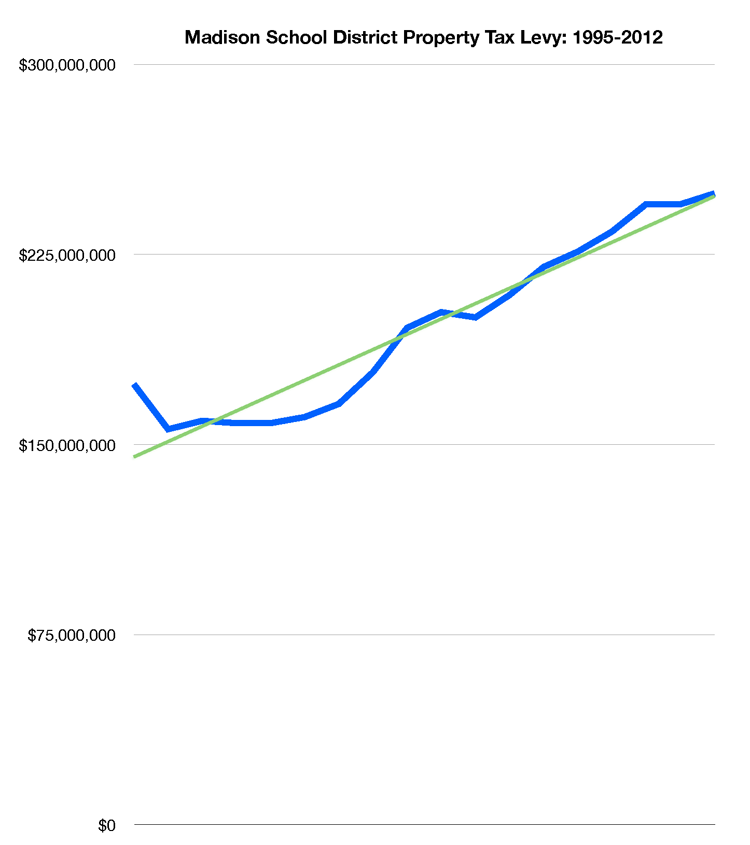
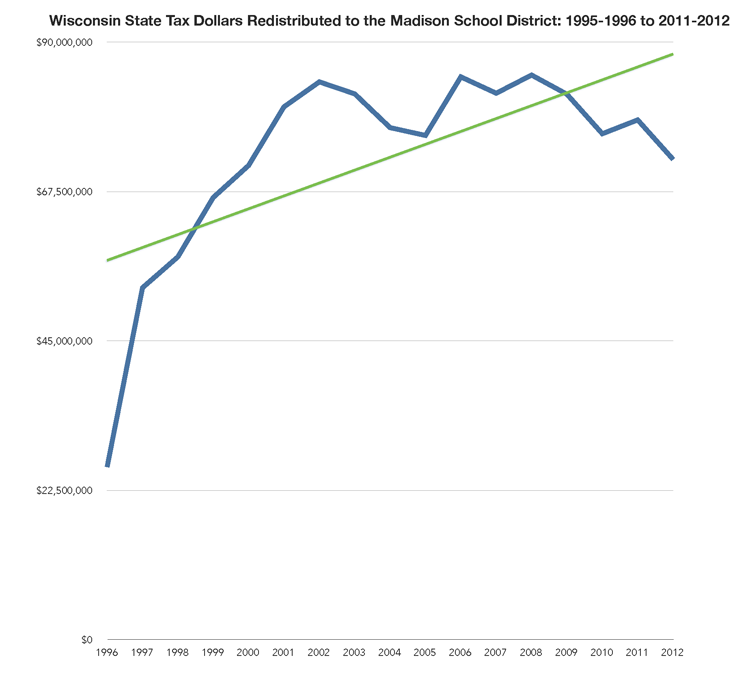
Where have all the students gone?
In closing, I’ve found that full budget information is much easier to find and review from Boston (spends more, but has lots of student choice) and Long Beach (spends quite a bit less per student, but offers more student choice).
Superintendent Jennifer Cheatham mentioned Boston and Long Beach as urban districts that have narrowed the achievement gap. Both districts offer a variety of school governance models, which is quite different than Madison’s long-time “one size fits all approach”.
Wisconsin’s stürm and drang over “Act 10” is somewhat manifested in Madison. Madison’s government schools are the only Wisconsin District, via extensive litigation, to still have a collective bargaining agreement with a teacher union, in this case, Madison Teachers, Inc.
The Madison School Board and Administration are working with the local teachers union on a new “Handbook”. The handbook will replace the collective bargaining agreement. Maneuvering over the terms of this very large document illuminates posturing and power structure(s) in our local government schools.
Madison Superintendent Jennifer Cheatham wrote recently (September 17, 2015 PDF):
The Oversight group was able to come to agreement on all of the handbook language with the exception of one item, job transfer in the support units. Pursuant to the handbook development process, this item was presented to me for review and recommendation to the Board. My preliminary recommendation is as follows:
Job Transfer for all support units
(See Pages 151, 181, 197, 240, 261)Superintendent Recommendation
That the language in the Handbook with regard to transfer state as follows: Vacancies shall first be filled by employees in surplus. The District has the right to determine and select the most qualified applicant for any position. The term applicant refers to both internal and external candidates for the position.The District retains the right to determine the job qualifications needed for any vacant position. Minimum qualifications shall be established by the District and equally applied to all persons.
Rationale/Employee Concern
Rationale:
It is essential that the District has the ability to hire the most qualified candidate for any vacant position—whether an internal candidate or an external candidate. This language is currently used for transfers in the teacher unit. Thus, it creates consistency across employee groups.
By providing the District with the flexibility of considering both internal and external candidates simultaneously the District can ensure that it is hiring the most qualified individual for any vacant position. It also gives the District opportunities to diversify the workforce by expanding the pool of applicants under consideration. This change would come with a commitment to provide stronger development opportunities for internal candidates who seek pathways to promotion.Employee Concern:
The existing promotional system already grants a high degree of latitude in selecting candidates, including hiring from the outside where there are not qualified or interested internal applicants. It also helps to develop a cadre of dedicated, career-focused employees.
September 24, 2015 Memo to the Madison government schools board of education from Superintendent Jennifer Cheatham:
To: Board of Education
From: Jennifer Cheatham, Superintendent of Schools
RE: Update to Handbook following Operations Work GroupThe Operations Work Group met on Monday September 21, 2015. Members of the Oversight Group for development of the Employee Handbook presented the draft Employee Handbook to the Board. There was one item on which the Oversight Group was unable to reach agreement, the hiring process for the support units. Pursuant to the handbook development process, this item was presented to me for review and recommendation to the Board. There was discussion around this item during the meeting and, the Board requested that members of the Oversight Group meet again in an attempt to reach consensus.
Per the Board’s direction, District and employee representatives on the Oversight Group came together to work on coming to consensus on the one remaining item in the Handbook. The group had a productive dialog and concluded that with more time, the group would be able to work together to resolve this issue. Given that the Handbook does not go into effect until July1, 2016, the group agreed to leave the issue regarding the hiring process for the support units unresolved at this point and to include in the Handbook the phrase “To Be Determined” in the applicable sections. As such, there is no longer an open item. When you vote on the Handbook on Monday, the section on the “Selection Process” in the various addenda for the applicable support units will state “To Be Determined” with an agreement on the part of the Oversight Group to continue to meet and develop final language that the Board will approve before the Handbook takes effect in the 2016-17 school year.
Current Collective Bargaining Agreement (160 page PDF) Wordcloud:
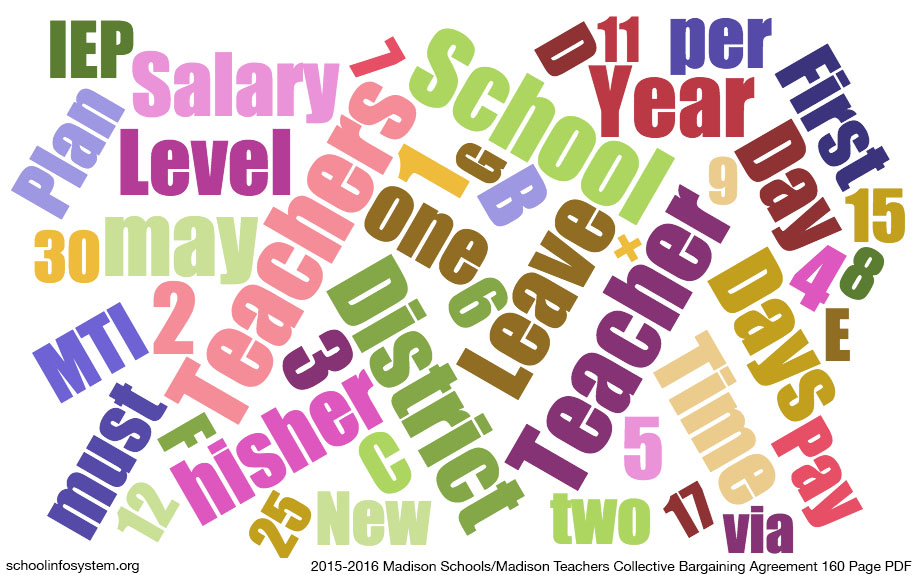
Proposed Employee Handbook (304 Page PDF – 9.21.2015 slide presentation) Wordcloud:
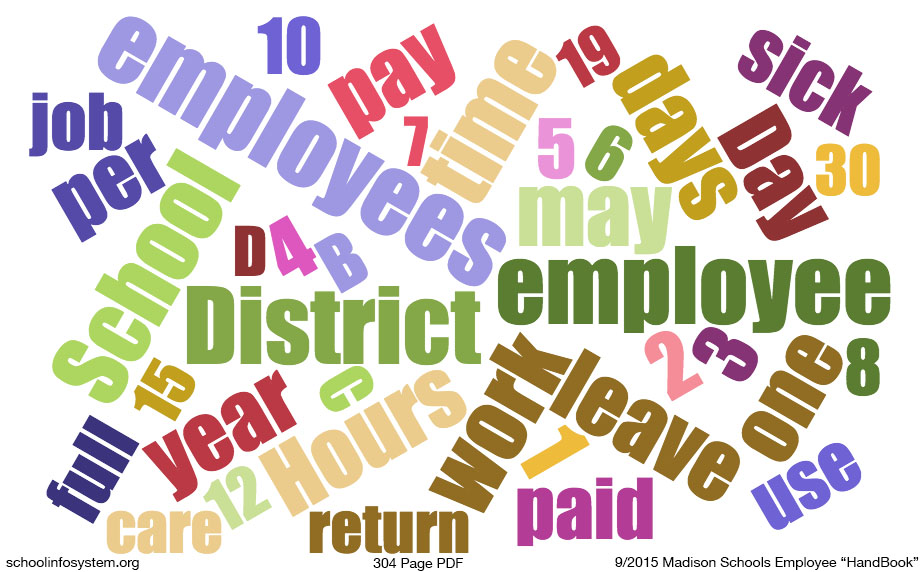
Background:
1. The Wisconsin Institute for Law and Liberty has filed suit to vacate the Madison government schools collective bargaining agreement with Madison Teachers, Inc.
2. Attorney Lester Pines has spent considerable time litigating Act 10 on behalf of Madison Teachers, Inc. – with some success.
3. The collective bargaining agreement has been used to prevent the development of non-Madison Government school models, such as independent charter, virtual and voucher organizations. This one size fits all approach was manifested by the rejection [Kaleem Caire letter] of the proposed Madison Preparatory Academy IB charter school.
4. Yet, Madison has long tolerated disastrous reading results, despite spending more than $15,000 per student annually. See also “What’s different, this time?”
5. Comparing Madison, Long Beach and Boston government school teacher union contracts. Current Superintendent Jennifer Cheatham has cited Boston and Long Beach government schools as Districts that have narrowed the achievement gap. Both government districts offer a variety of school governance models, which is quite different than Madison’s long-time “one size fits all approach”.
6. Nearby Oconomowoc is paying fewer teachers more.
7. Minneapolis teacher union approved to authorize charter schools.
8. Madison Teachers, Inc. commentary on the proposed handbook (Notes and links). Wordcloud:
9. A rather astonishing quote:
“The notion that parents inherently know what school is best for their kids is an example of conservative magical thinking.”; “For whatever reason, parents as a group tend to undervalue the benefits of diversity in the public schools….”
– Madison School Board member Ed Hughes.
10. 1,570,000 for four senators – WEAC.
11. Then Ripon Superintendent Richard Zimman’s 2009 speech to the Madison Rotary Club:
“Beware of legacy practices (most of what we do every day is the maintenance of the status quo), @12:40 minutes into the talk – the very public institutions intended for student learning has become focused instead on adult employment. I say that as an employee. Adult practices and attitudes have become embedded in organizational culture governed by strict regulations and union contracts that dictate most of what occurs inside schools today. Any impetus to change direction or structure is met with swift and stiff resistance. It’s as if we are stuck in a time warp keeping a 19th century school model on life support in an attempt to meet 21st century demands.” Zimman went on to discuss the Wisconsin DPI’s vigorous enforcement of teacher licensing practices and provided some unfortunate math & science teacher examples (including the “impossibility” of meeting the demand for such teachers (about 14 minutes)). He further cited exploding teacher salary, benefit and retiree costs eating instructional dollars (“Similar to GM”; “worry” about the children given this situation).
Schwerpunkt via wikipedia.
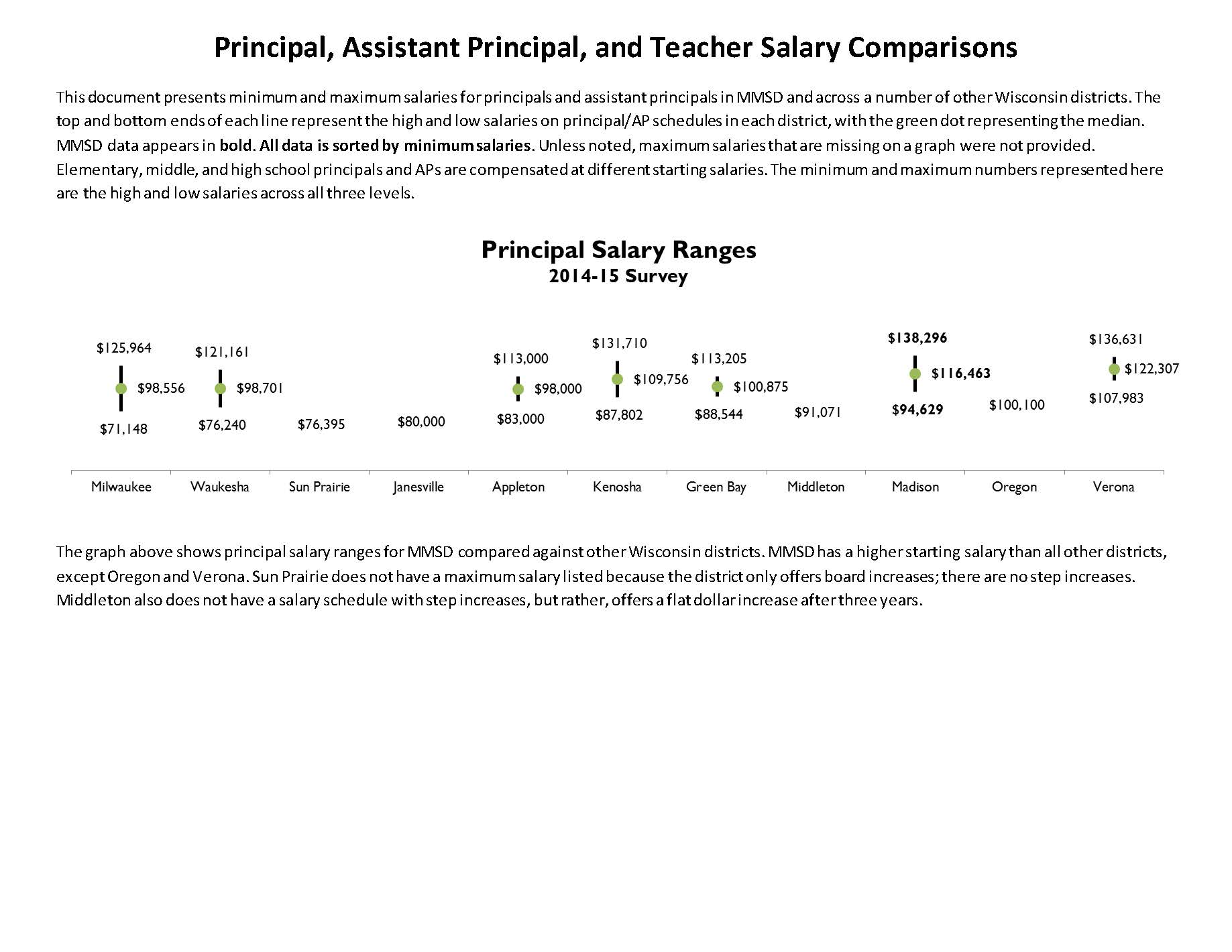

Tap to view larger versions.
Deirdre Hargrove-Krieghoff:
In support of the continued work of developing a thriving workforce, the HR team conducted a survey of the 10 largest districts in the State of Wisconsin as well as districts in Dane County to provide a picture of our current compensation standing. It is our intent to develop and maintain a competitive salary structure for all of our employees, and we are committed to creating a structure that attracts the highest performers and is equity based.
The following information was developed for a specific budget-related purpose – to help determine, on a macro level, where the district stands relative to comparables for principal and teacher salaries, and whether a significant budget allowance (additional funding) is needed in 2015-16 for the specific purpose of adjusting to market comparables.
Please note:
When reviewing the data for Principals and Assistant Principals, it is illustrating the range that a candidate could make entering the district. For the Teacher base it shows the starting range for a beginning teacher. Maximum salaries are not listed, as most districts that reported are in the process of restructuring their salary schedules for teachers.Approximately 80 out of the 320 of teachers hired annually actually come in at the base step of $37,263.The data suggests that compared to other districts represented, MMSD is mid to low in salary placement for Assistant Principals and Teachers and mid to high for salary placement for Principals.
Some districts represented, have moved away from the traditional approach of funding salary steps and tracks within their schedules and are front loading their schedule to be more competitive, this shift may cause their ranges to be higher than MMSD.
Presumably, a real comparison might include total compensation and outcomes, not to mention qualification differences.
Notes and links:
Madison School Board Member Ed Hughes, writing in 2005:
“This points up one of the frustrating aspects of trying to follow school issues in Madison: the recurring feeling that a quoted speaker – and it can be someone from the administration, or MTI, or the occasional school board member – believes that the audience for an assertion is composed entirely of idiots.”
Comparing Madison and other District approaches to teacher benefits. Staffing compared: Madison, Long Beach & Boston.
The Madison School District (3MB PDF):
Five Priority Areas (just like the “Big 10”) but who is counting! – page 6:
– Common Core
– Behavior Education Plan
– Recruitment and hiring
– New educator induction
– Educator Effectiveness
– Student, parent and staff surveys
– Technology plan
2014-2015 “budget package” 3MB PDF features some interesting changes, beginning on page 92, including:
1. + $986,314 to other Wisconsin public school districts due to Outbound open enrollment growth and $160,000 for Youth Options (page 108)
2. + 5.3% Teacher & Staff Health insurance spending is $44,067,547, or 11% of total spending! (Page 92). Total teacher & staff benefits are $73,248,235 or 18% of total spending. Let’s compare (as best we can):
Madison: 18% budget web page. Note, Madison’s is likely higher than 18% as I did not count all “funds” beyond teachers and certain staff. I’ve sent an email to the District for a complete number.
Middleton: 15.7% 2013-2014 Budget (PDF) Middleton – Cross Plains School District Budget web page. Middleton’s document summarizes spending across all funds (Page 8), something that I did not find in the Madison document (Pages 110-123 summarize aspects of Madison’s spending).
Boston: 14.1% Boston Schools 2013-2014-2015 budget xls file) Boston schools’ budget information.
Long Beach: 15.9% (Long Beach Budget Document (PDF)) Long Beach budget information.
Madison Superintendent Cheatham cited the Boston and Long Beach Schools for “narrowing their achievement gap” during a July, 2013 “What Will be Different This Time” presentation to the Madison Rotary Club.
3. “Educational Services” (Page 96) benefits are $21,581,653 up 4.5%.
4. “Food Services” (Page 98) benefits are $2,446,305, up 4.2%.
5. 10.3%: MSCR’s health insurance cost increase (page 99). MSCR spending and property tax growth (“Fund 80”) has been controversial in the past.
The Madison School District’s per student spending has been roughly constant for several years at about $15,000. Yet, certain budget elements are growing at a rather high rate, indicating an ability to manage effectively by reallocating and raising tax dollars or the presence of a rather fluid budget.
“focused instead on adult employment”
Retired Ripon Superintendent Richard Zimman’s 2009 Madison Rotary speech is always worth revisiting:
Zimman’s talk ranged far and wide. He discussed Wisconsin’s K-12 funding formula (it is important to remember that school spending increases annually (from 1987 to 2005, spending grew by 5.10% annually in Wisconsin and 5.25% in the Madison School District), though perhaps not in areas some would prefer.
“Beware of legacy practices (most of what we do every day is the maintenance of the status quo), @12:40 minutes into the talk – the very public institutions intended for student learning has become focused instead on adult employment. I say that as an employee. Adult practices and attitudes have become embedded in organizational culture governed by strict regulations and union contracts that dictate most of what occurs inside schools today. Any impetus to change direction or structure is met with swift and stiff resistance. It’s as if we are stuck in a time warp keeping a 19th century school model on life support in an attempt to meet 21st century demands.” Zimman went on to discuss the Wisconsin DPI’s vigorous enforcement of teacher licensing practices and provided some unfortunate math & science teacher examples (including the “impossibility” of meeting the demand for such teachers (about 14 minutes)). He further cited exploding teacher salary, benefit and retiree costs eating instructional dollars (“Similar to GM”; “worry” about the children given this situation).
Zimman noted that the most recent State of Wisconsin Budget removed the requirement that arbitrators take into consideration revenue limits (a district’s financial condition @17:30) when considering a District’s ability to afford union negotiated compensation packages. The budget also added the amount of teacher preparation time to the list of items that must be negotiated….. “we need to breakthrough the concept that public schools are an expense, not an investment” and at the same time, we must stop looking at schools as a place for adults to work and start treating schools as a place for children to learn.”
The price of budget spaghetti manifests itself via little to no oversight – see legitimate questions on the District’s most recent $26,200,000 maintenance referendum (another tax increase looms). These documents, while reasonably detailed, are impossible to compare to recent budgets.
The demise of Lawrie Kobza’s 2 page “citizen’s budget” will lead to growing cost of living and achievement gaps, including nearby Districts such as Middleton where a comparable homeowner spends 16% less on property taxes.
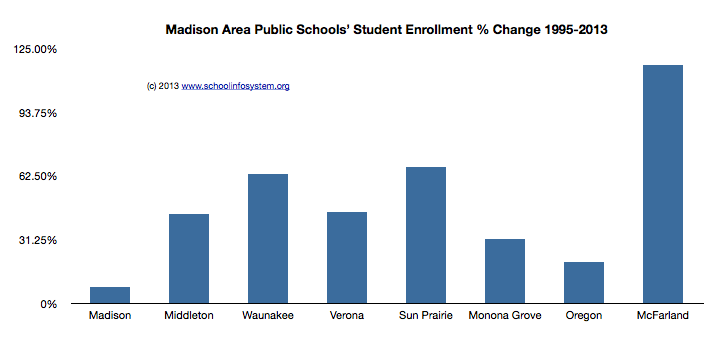
Where have all the students gone?
Madison School Board President Ed Hughes:
Esenberg sets out to identify the fundamental differences between voucher advocates and opponents. His thesis is that views on vouchers derive from deeper beliefs than objective assessments of how well voucher schools perform or concerns about vouchers draining funds from public schools. To him, your take on vouchers depends on how you view the world.
Esenberg asserts that voucher advocates are united by their embrace of three fundamental principles: that a centralized authority is unlikely to be able to decide what is best for all; that families should be trusted to select their children’s schools since ordinary people are capable of making choices for themselves without paternalistic direction; and that “government does not do diversity, experimentation and choice very well.”
By implication, he asserts that voucher opponents think that a centralized authority will be able to decide what’s best for all, that families shouldn’t be trusted to make choices for their children, and that government control is the best way to foster innovation.
And there you have it. Your views on school voucher expansion are entirely explained by whether you prefer individual freedom, like the voucher advocates, or stultifying government control, like the voucher opponents. In cinematic terms, voucher opponents are the legions of lifeless, gray drones in Apple’s famous 1984 commercial and voucher supporters are the colorful rebel, bravely challenging the control of Big Brother and hurling her sledgehammer to smash mindless conformity. You couldn’t ask for a more sophisticated analysis than that, could you?
While his thesis invites mockery, Esenberg’s short article does present a bit of a challenge to voucher opponents like myself. Can we set out a coherent justification for our opposition that doesn’t depend on the facts that voucher schools drain needed resources from public schools and don’t perform any better? Sweeping those fairly compelling points aside, Esenberg asks, in effect, what else you got?
Mr Hughes anti-voucher rhetoric is fascinating on several levels:
1. The Madison School District’s long term, disastrous reading results. How much time and money has been wasted on anti-voucher rhetoric? Reading has long been job one.
2. Local private schools do not have much, if any availability.
3. Madison spends double the national average per student (some of which has been spent on program explosion). Compare Milwaukee Public and Voucher Schools’ Per Student Spending.
4. Madison’s inability to address its long-term disastrous reading results will bring changes from State or Federal legislation or via litigation.
5. Superintendent Cheatham cited Long Beach and Boston as urban districts that have “narrowed the achievement gap”. Both districts offer a variety of school governance models, which is quite different than Madison’s long-time “one size fits all approach”.
I recall being astonished that previous Madison School District administrators planned to spend time lobbying at the State level for this or that change – while “Rome is burning“. Ironically, Superintendent Cheatham recently said:
“Rather than do a lot of work on opposing the voucher movement, we are going to focus on making sure our schools are the best schools possible and the schools of choice in Madison,” Cheatham said.
This points up one of the frustrating aspects of trying to follow school issues in Madison: the recurring feeling that a quoted speaker – and it can be someone from the administration, or MTI, or the occasional school board member – believes that the audience for an assertion is composed entirely of idiots.
A great, salient quote. I would hope that the District would focus completely on the matter at hand, disastrous reading scores. Taking care of that problem – and we have the resources to do so – will solve lots of other atmospheric and perception issues.
In closing, I sense politics in the voucher (and anti-open enrollment) rhetoric. Two Madison School Board seats will be on the Spring, 2014 ballot. One is currently occupied by Mr. Hughes, the other by Marj Passman. In addition, local politics play a role in becoming school board President.
15mb mp3 audio.
Superintendent Cheatham’s slides follow (4MB PDF version). I hope that the prominence of Madison’s disastrous reading scores – slide 1 – indicates that this is job one for our $15,000ish/student organization.
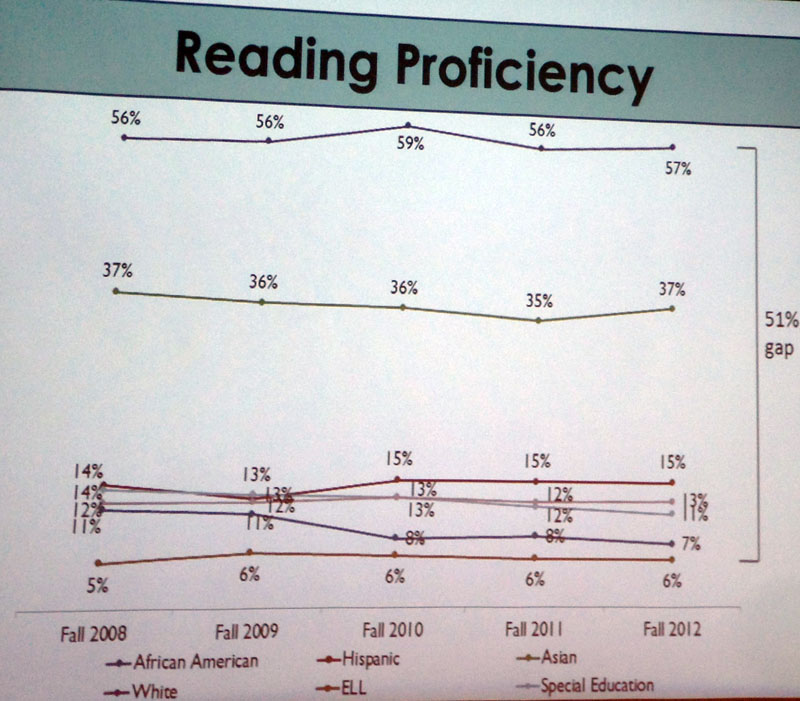
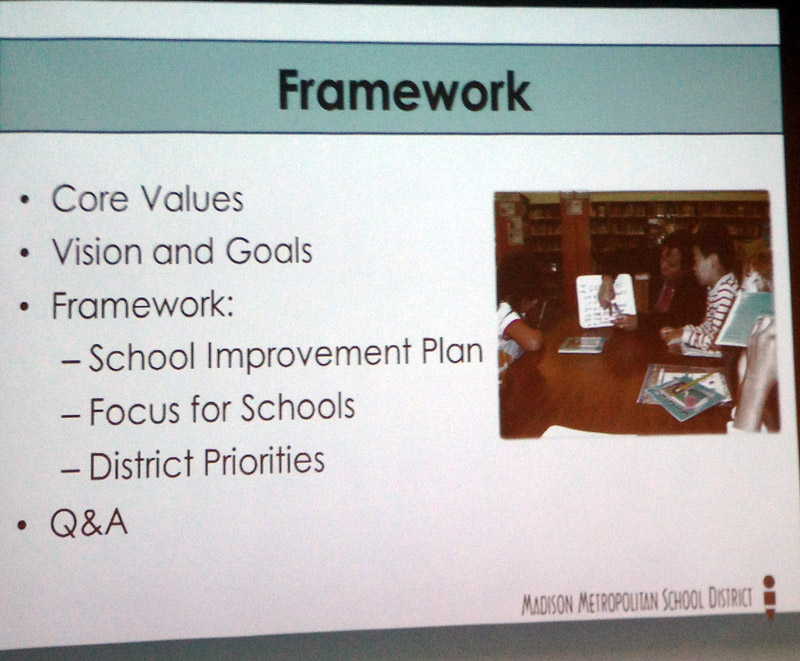
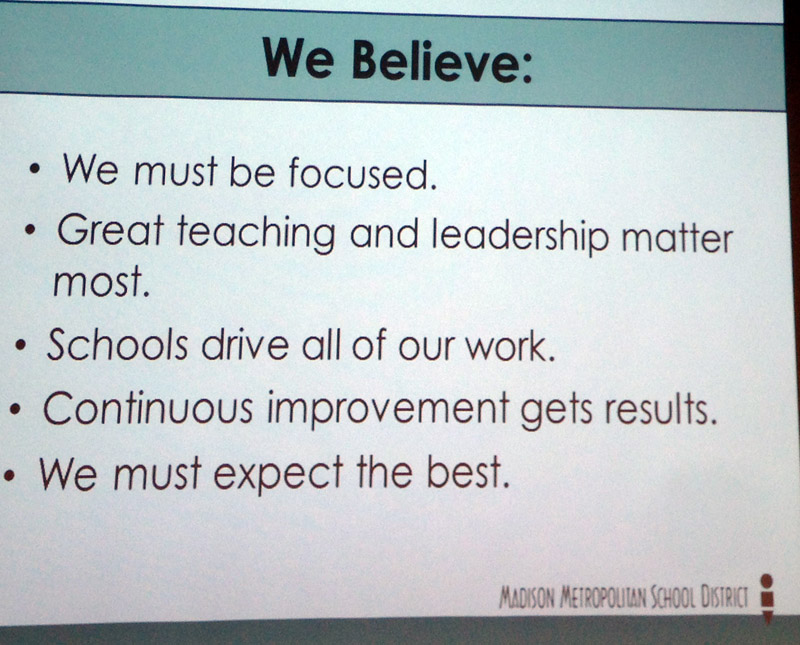
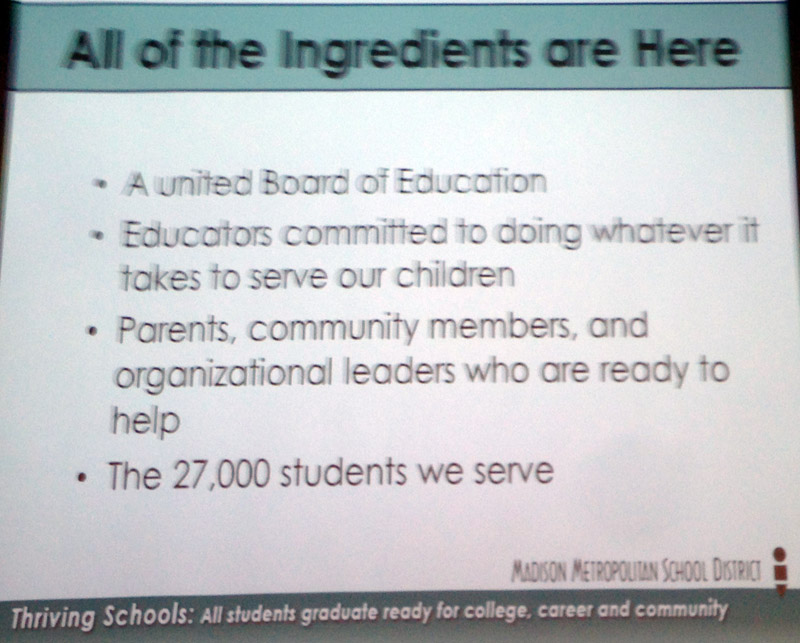
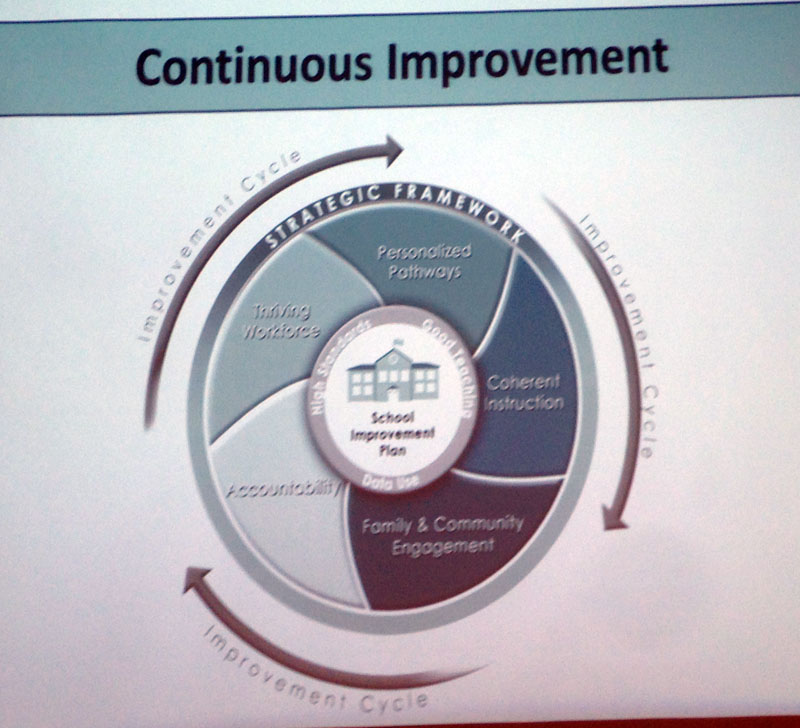
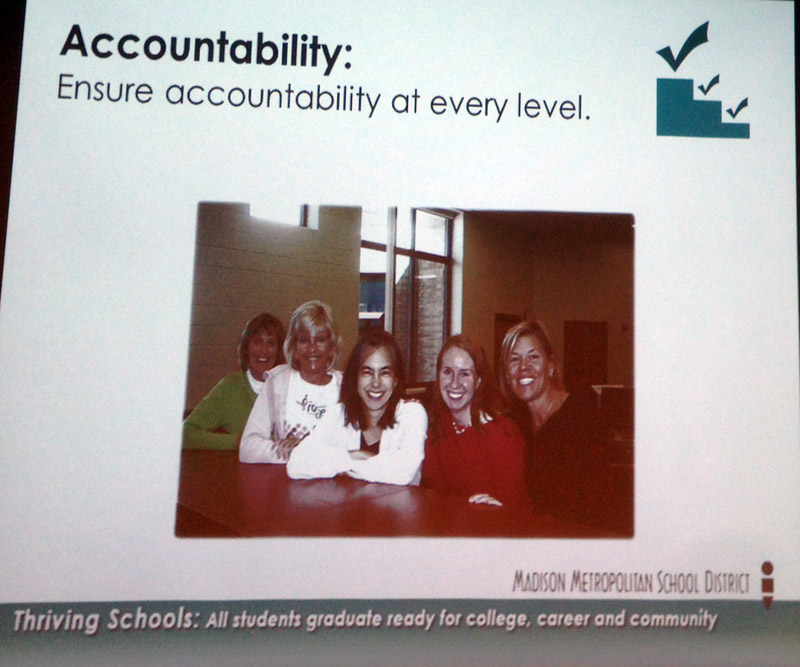
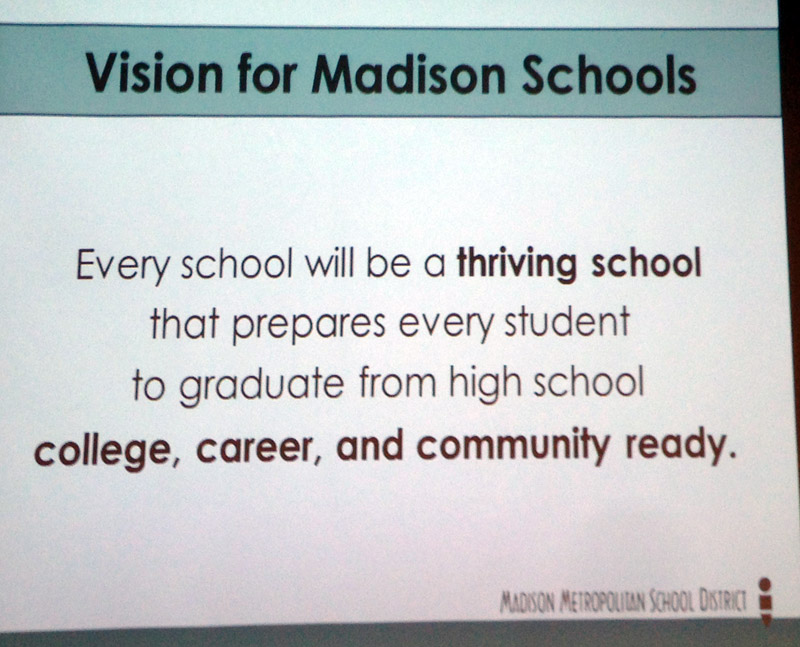
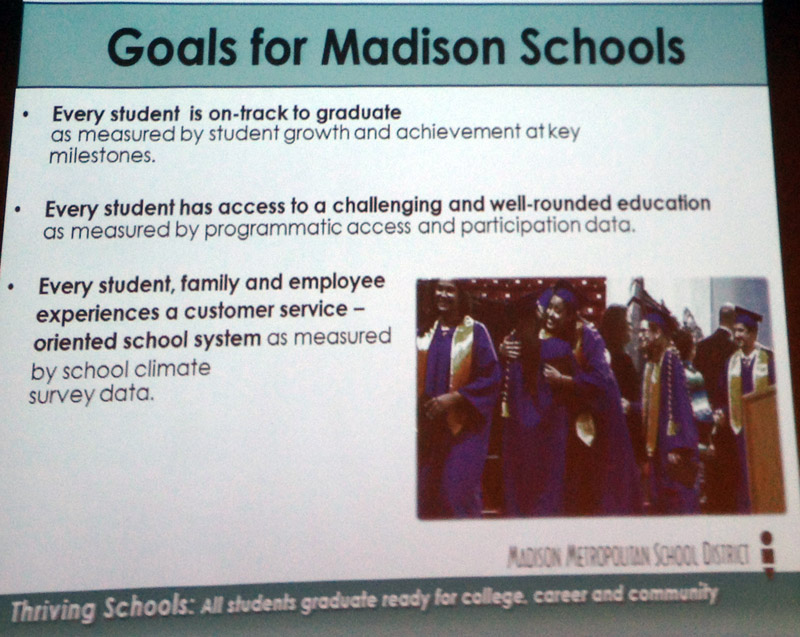
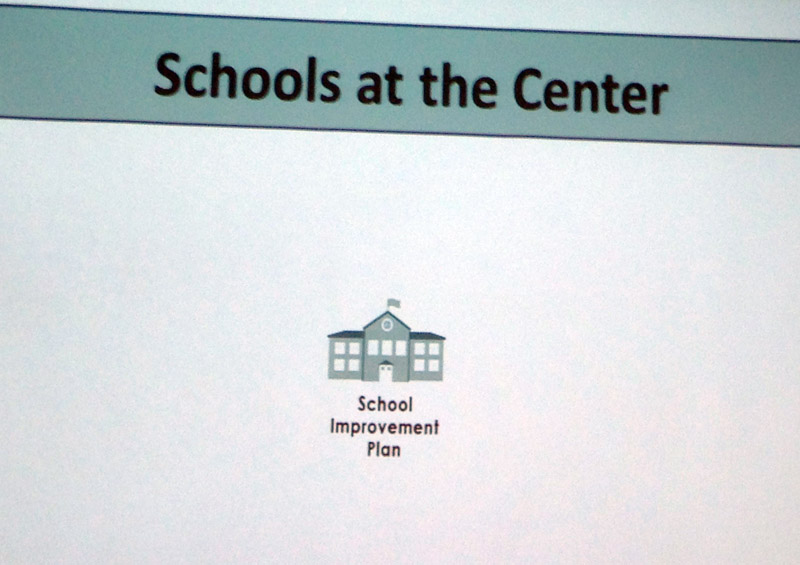
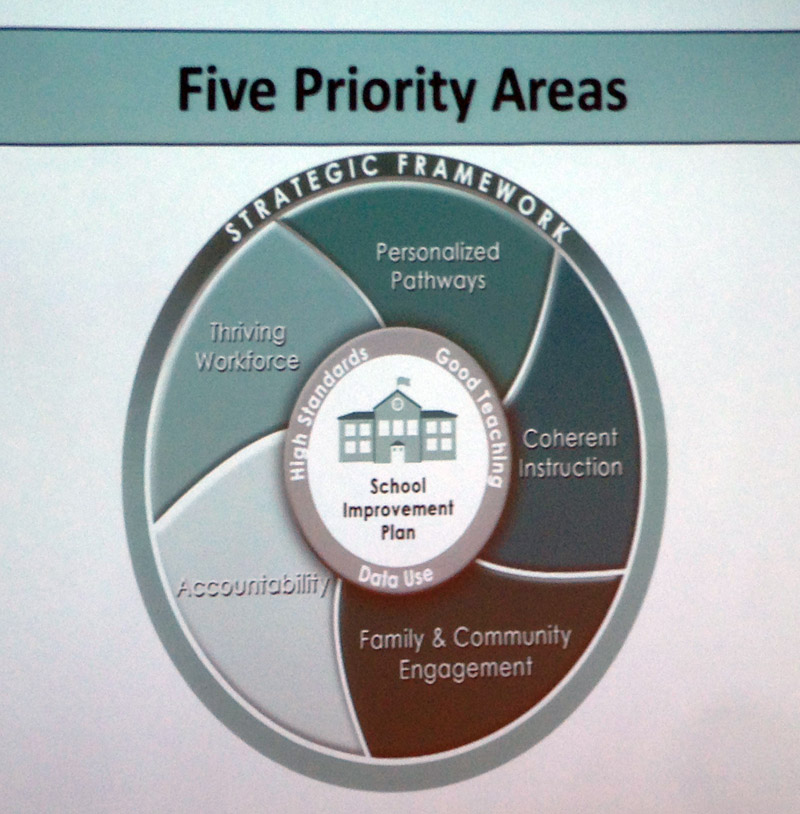
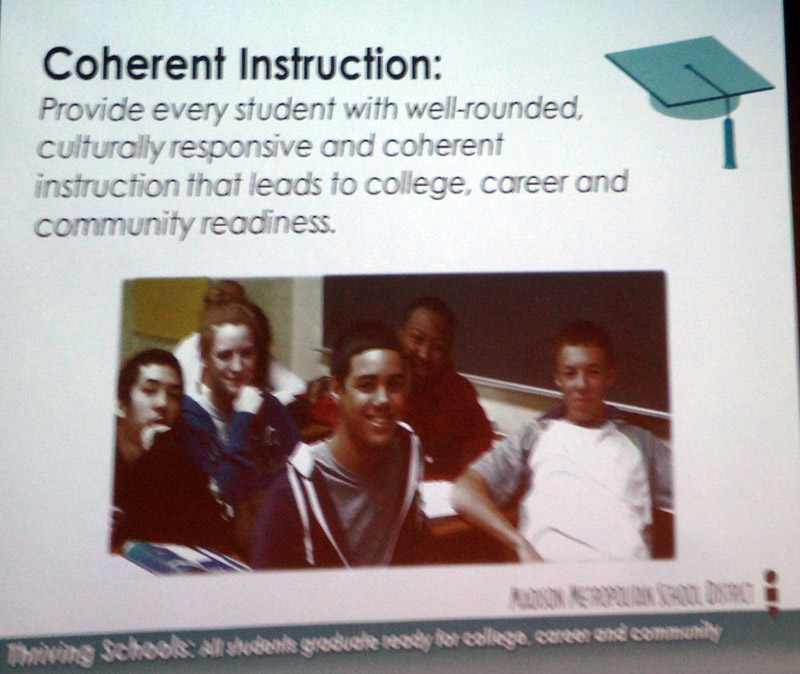
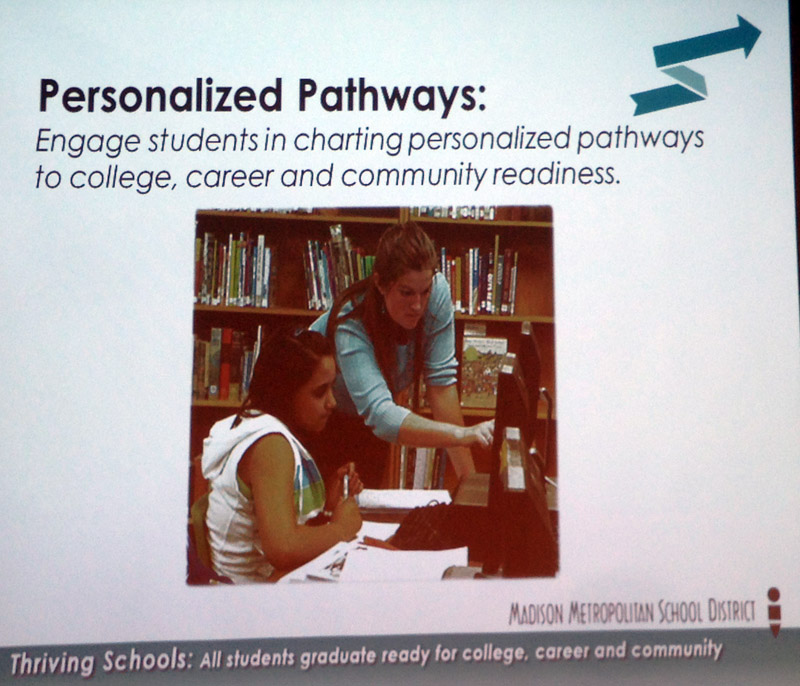
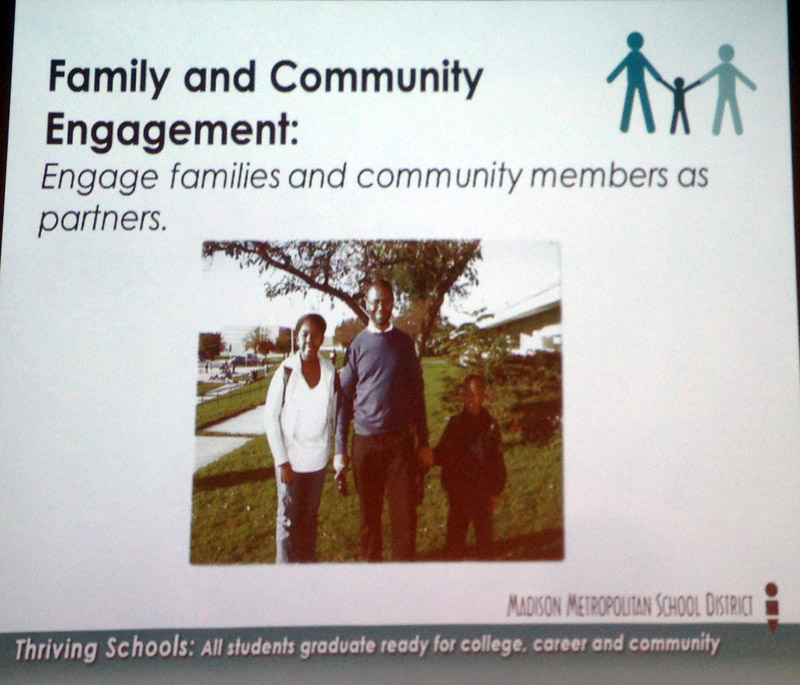
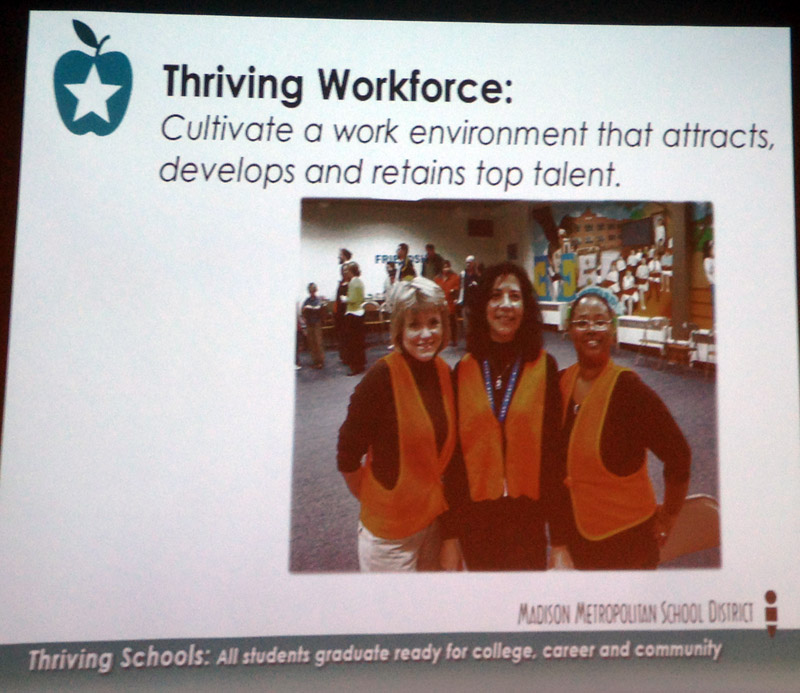
A few of the Superintendent’s words merit a bit of analysis:
1. “What will be different this time?” That rhetoric is appropriate for our Madison schools. I compiled a number of notes and links on this subject, here.
2. “Ready to partner with local businesses and other organizations”. Great idea. The substance of this would certainly be a change after the Madison Preparatory Academy IB Charter school debacle (Urban League) and, some years ago, the rejection of Promega’s kind offer to partner on Madison Middle Schools 2000.
3. Mentions “all Madison schools are diverse”. I don’t buy that. The range of student climate across all schools is significant, from Van Hise and Franklin to LakeView, Mendota and Sandburg. Madison school data by income summary. I have long been astonished that this wide variation continues. Note that Madison’s reading problems are not limited to African-American students.
4. Mentioned Long Beach and Boston as urban districts that have narrowed the achievement gap. Both districts offer a variety of school governance models, which is quite different than Madison’s long-time “one size fits all approach”.
5. Dave Baskerville (www.wisconsin2.org) asked a question about benchmarking Madison students vs. the world, rather than Green Bay and Milwaukee. Superintendent Cheatham responded positively to that inquiry. Interestingly, the Long Beach schools prominently display their status as a “top 5 school system worldwide”.
6. “Some teachers and principals have not been reviewed for as long as 7 years”. This points to the crux of hard decision making. Presumably, we are at this point because such reviews make no difference given rolling administrator contracts and a strong union umbrella (or floor depending on your point of view). Thus, my last point (below) about getting on with the hard decisions which focus the organization on job number one: reading.
Pat Schneider and Matthew DeFour summarize the Superintendent’s press release and appearance.
Finally, I found it a bit curious that the Superintendent is supporting spending (and related property tax growth) for current programs in light of the larger strategy discussed today along with the recent “expert review”. The review stated that the “Madison School District has resources to close achievement gap”
This would be a great time to eliminate some programs such as the partially implemented Infinite Campus system.
Superintendent Cheatham’s plan indicates that choices will be made so that staff and resources can focus on where they are most needed. I wholeheartedly agree. There is no point in waiting and wasting more time and money. Delay will only increase the cost of her “strategy tax“.

schoolinfosystem.org